This article is written by Ananya Shukla, Aastha Singh and Rajeshwari Ishu, from Chanakya National Law University, Patna.
Table of Contents
Abstract
Ever since the advent of the era of the Internet, a new question has started to emerge with respect to the concept of internet access as a right. People have started to advocate their voices about the importance of this as a right. Different international organizations and countries give different status to this as a right. In India, Kashmir is a state which has been put under more than 200 internet shutdowns in the past 3 years. Given how the internet has become a part of our daily lives and to a certain extent, we are reliant on it to get things done, what happens when the access to such service is taken away. In this paper, we will be analyzing the concept of Right to Internet access as a Human Right, how it is embodied in other basic rights.
We will further analyze the position of Right to Internet Access as a right in India, and we will take reference to preceding case laws in the matter to understand what is the current status quo of Internet Access as a right, whether it is a part of other fundamental rights, and whether or not the Internet shutdowns are in consistent with the rights of the people. With respect to the recent pandemic, the internet has become the medium of work and the source of every essential thing, including education. We have also conducted a short survey, asking certain questions on Internet ban from people belonging to different states throughout the country. Based on the survey, we will be drawing results about the view of the people with respect to the internet as a right. We will answer certain questions that we introduce in the beginning of this study by taking the survey and the study into account.
Introduction
With the rapid evolution of technology and Internet playing a pivotal role in this change, a question arises, whether Internet Access is a basic right, and whether or not the state can impose restrictions on the use of these services. In 2016, the United Nations declared access to the internet as a basic human right.[1] Web plays a very important role not only because of its information and vastness, but also because it has the potential to change the world. It is a part of a decent living, and could serve as the key to protecting other fundamental rights. Ever since the outbreak of pandemic in 2020, internet Services have emerged as the solution to billions of people.
Chuck Robbins, the Chairman and Chief Executive of Cisco put forth that COVID-19 crisis has highlighted the possibilities of remote working and at the same time, it has also exposed the vulnerabilities of those who do not have access to the internet. Given the current course of things due to the pandemic, it only suffices to say that Internet and Broadband service have acted like a life support system. They are not only a constant source of information, it also plays an essential role for the economy and education. The present situation was successful in bringing to fore the importance of the role that technology plays in our life.
Background
In India, there are certain rights that are guaranteed to every citizen in the country, and these rights are meant to be protected by the state. It is only under certain rare conditions in the interest of the state, where certain of these rights can be taken away. When the Government of India revoked Article 370 of the Constitution of India (this Article grants a special status to the State of Jammu and Kashmir), it incited mass protests and violence in the valley. In order to take control of the situation, the internet, newspaper and every other source of information was shut down in the valley. This was not the first time that the internet services in the state of Jammu and Kashmir were shut down. Since 2012, it is the state which has been subjected to the maximum number of internet shutdowns. Even today, the people in Jammu and Kashmir (hereinafter J&K) do not have access to 4G connectivity. This shutdown of services for a continued period of time in the valley attracted criticism. It was said that such restriction was violating the fundamental rights of the people of J&K, this practice of imposing a ban on the internet services of the state for a continued period of time was not justified.
Against the background of the importance of the role that the internet plays in the 21st Century, many countries and international organizations have committed themselves to develop a widespread use of the internet. Countries including Estonia, Greece, France, Finland, Costa Rica, Spain and Canada have granted the status of a basic right to internet access. The ban of internet services doesn’t mean a mere restriction on the communication services, instead it is more like a blanket ban, and it affects all walks of one’s life. With the promotion of schemes like Digital India on one hand and suspension of internet services in a state on the other, that too for over 200 days makes it seem fairly unreasonable and far-fetched.
Issues
However, the question of whether or not it should be given the status of a fundamental right is still lingering. There are in fact certain contradictory opinions about its status as a human right- In 2012, Mr. Vincent G. Cerf, who is also recognized as one of the “fathers of the internet” presented his opinion in New York Times and said that internet access is not a human right, as it doesn’t meet a higher threshold nor is it essential for humans to live a meaningful and dignified life. He said that technology is a means to enable freedom, but it is not the end itself (An enabler of rights, but not a right itself).[2] In our article, we will discuss the following issues:
- the status of Internet Access as a Right in itself,
- its relation with other basic rights,
- the status of the internet ban in the state of Jammu and Kashmir,
- the stand of the Hon’ble Apex Court in respect of the same,
- international standing of this right,
- and the survey that will put forth a summary of the citizen’s take on the status of Internet Access as a right.
Internet: call for public utility
With the age of information technology taking over the world, the versatility of the internet needs no evidence to prove its serviceability in the daily life of an individual across the globe. However, because of our practical dependency on the internet and its utility, it has become a potent weapon at the hands of the government to control riots and masses by posing a shutdown to its accessibility. Since 2010 India has witnessed a total 121 internet shutdowns excluding the state of Jammu and Kashmir, proudly taking a lion’s share in contributing to total shutdowns across the world.[3] In 2016, the city of Darjeeling witnessed India’s first longest shutdown of 100 days followed by Jammu and Kashmir, which witnessed as many as 205 shutdowns in 3 years.
Jammu and Kashmir broke the record of the longest internet shutdown that mankind has witnessed since technological efflorescence with a total amounting to 213 days till March 2020.[4] This has involuntarily forced out a population of 8 million people to live an unsatisfactory life in lack of proper communication as a result of a labored plan of revocation of Article 370 by the Centre. The contrived plan to contain the threats to the Centre, the lack of access to internet has driven at least 5 lakh people out of their jobs with a total loss in crores to the economy of the State.[5] Even after the tedious war between the Centre and the residents, the State denied to enable 4G network after the Supreme Court articulated that access to internet is a latent component of Right to Life under Article 21 of the Constitution of India.[6]
We must begin our quest in unraveling that the internet is no longer a luxury but a need of public utility in the 21st Century by looking at the disruption of life it has caused in different fields during its absence in the state.
Economy
The research by International Council for Research on International Economy Relations (ICRIER) established that the state incurred a loss of Rs. 4,000 Crores in the last six years alone due to disturbed internet services and a ballpark figure of Rs. 1,776 Crores losses due to 34 internet shutdowns in 2017 itself.[7] While the Kashmir Chamber of Commerce and Industries gave a detailed report calculating a loss of Rs. 18,000 Crores incurred to the valley since August 5, 2019 and drove out at least 5000 salesmen out of livelihood who were employed as agents in tourism and mobile phone shops and a total of 4.5 lakh jobs have been lost since the shutdown began causing an average loss of Rs. 165 Crores each day to the economy of Jammu and Kashmir till December.[8]
The online business and tourism faced a severe blow after the clampdown which forced many residents to migrate to other parts of India to save their employment. The internet shutdown has caused disruption of life to people living in valleys who earned their livelihood by uploading travel videos, researchers for other companies, software engineers, travel agencies, web developers inter alia, even after being promised by the government to generate employment for youngsters in the valley.[9] But the worst affected section remained the handicraft workers and tourism sector including hotels and travel agencies which witnessed the lowest income in the year 2019 with a loss of at least 70, 000 jobs in handicraft.[10]
Education
The age old armed conflict in Jammu and Kashmir increased after the revocation of Article 370 which has affected the education system in the state drastically with closing down of school and colleges, violence against children. Such acts are in violation of international standards of Juvenile Justice. Even after the reopening of education centers, low attendance was marked due to the compoundable fear of the parents in the valley in lack of internet accessibility and political insurgencies. The lives of students are hanging in predicament with no access to online material, lectures, e-books or books delivered through online portals. Even the facility to check Board exam results was hindered during this time.[11] The future of the students appearing for various entrance exams is at stake as it was seen that many students could not submit forms for NEET exams.
The lack of internet facility and inadequate numbers of computers available for students to access the internet is topped by the possibilities of not being able to appear for exams if the service is not restored at 4G speed soon. Downloading of forms and submission alone takes about 30 minutes but the real problem arises after the submission of the form. For downloading the online study material students have to travel to Jammu every now and then which alone costs a hefty amount to the middle class families. [12]
Internet in cashless economy, banking and government schemes
The government has realised that the internet is an important medium and has also promoted and based its various schemes related to internet access. Programmes like BharatNet, aiming to provide broadband connectivity to rural areas and PMGDISHA, aiming to make more than six crore persons in the rural areas digitally literate, which fall under the wider umbrella of the Digital India Scheme are in itself a loud and clear statement as to the plans of the government to increase internet accessibility. However, on the other hand, internet shutdowns only hinder it and cast a doubt in the minds of the general public as to what the real intention or plan of the government is.[13]
The demonetization of 2016 marked a paradigm shift in approach of the government to boost Indian Economy by replacing money at hand to direct cash transfer through e-wallets and internet banking. Reason being that the bank database can be easily tracked by the income-tax department to check corruption and circulation of black money in the market. Making the filing of ITR more feasible and accessible at the hand of the government. Apart from introducing a cashless economy, the government’s plan to make India a Digital Hub by 2025 has six essential pillars dependent on internet development and accessibility. However, this seems to be a far-fetched dream of the government to reach the national goal of making India a 5 trillion worth economy if the frequency of internet lockouts remain unchanged in future.
With all the work shifting online, working offline with limited resources is travelling back in time with no electricity. The government’s scheme and benefits such as Direct Benefit Transfer [DBT] scheme, which now caters 350 million Indians, Internet Fund transfers and Unified Payment System has witnessed a growth from 100,000 to 800 million transactions in 2019. The liberating steps of the government from the complex filing and bureaucratic impediments has installed a virtual life online and has indeed become a source of daily necessity catering robust support to community sustainability. [14]
Competitive analysis of the Honorable Supreme Court’s judgment and J&K Govt. retaliation
The conflict between the two neighbouring nations India and Pakistan is existing only because of the Union territory of Jammu & Kashmir. When India got independence from the British Empire after being ruled over for 200 years, Pakistan emerged as a new nation composed of Muslim majority separating itself from Indian Territory. The territory of J&K was given the option to join either of the countries. J&K’s population then consisted of 77% Muslims and 20% Hindus. In 1947, it was under the rule of Hindu ruler Raja Hari Singh.
There were riots and huge disturbance in the valley carried by Pakistan to frighten the ruler. The King under so much pressure asked for help from the Indian government. The ruler agreed to sign the Instrument of Accession. This act of the king was considered fraudulent by Pakistan and since 1947 they have been claiming Kashmir as its own land.
Analysis of Articles 370 and 35A
Article 370 of the Indian Constitution, 1950 was the biggest glitch in framing of the Constitution. Sheikh Mohammed Abdullah who was the first elected Prime Minister of J&K and Pt. Jawaharlal Nehru, first Prime Minister of India is said to be the architect of Article 370. It was introduced as a temporary provision in the Constitution but it became the integral part of the Constitution over decades. There have been many cases related to the Article in J&K High court and Supreme Court of India in the past where the court recognised the Article as permanent. Clause 7 of the Instrument of Accession signed by Maharaja Hari Singh declared that the State could not be compelled to accept any future Constitution of India. J&K had their separate Constitution and Penal Code which was known as Ranbir Penal Code. Most of the Indian laws were not applicable in the state because of Article 370. The Article also empowered the state to make its own laws. It gave the state status of special provisions. It was designed in such a way that it served the interest of Kashmiris. Article 35(A) of the Indian Constitution is its result.
Article 35(A) was inserted via the Constitution (Application to J&K) Order, 1954 to continue the old provisions of the territory regulations under Article 370 of the Indian constitution[15]. It provided special rights and privileges to permanent citizens of the state. Non-permanent residents of the state were not entitled to these privileges. In short these two Articles emphasised on “Kashmir for Kashmiris”.
Article 35 (A) has often been termed as constitutionally vulnerable. The permanent Resident law has been defined as violative of the Fundamental Rights enshrined in the Indian Constitution. There is discrimination on basis of gender as per the law. Females have been subordinated and are made subject to prejudice. There were many cases filed in the High Court of J&K and Supreme Court of India by female residents where they questioned how marrying a non-permanent citizen of Kashmir could deprive them of their right to property. The judgment was not in their favour and the court described it as no violation of fundamental rights. However, it was later realised by the court that there was discrimination based on gender.
Both the Articles have done more harm to both the local residents of Kashmir as well as to the nation as a whole. There have been several wars from both China and Pakistan because of Kashmir. Till today parts of J&K are under illegal control of both the neighbouring countries. The Kashmir issue had been raised numerous times at the UN General Assembly but no permanent solution was achieved.
Democracy was never fully implemented, corruption kept on rising, there was no development in the state, the political parties were always engaged with Pakistan and helped them in spreading violence and their profitable agenda in the valley. Terrorism was at its peak, the local residents protected them by providing shelter and misguiding the army in valley. The minorities were tortured and were deprived of their rights, there was discrimination on basis on gender. Education was neglected and small children were pushed into part of terrorism group in name of independence from the Indian government. The sole reason for so many atrocities was the existence of the two Articles. They were an open threat to national interest and national security. Their abolition seemed as chimera even after seven decades of Independence.
Revocation of Article 370 and 35A
Finally when in 2019 the Central government brought the resolution of revoking both Article 370 and Article 35 (A) via Jammu and Kashmir Reorganisation Act, 2019. The Act benefitted the Indian government to control the actions of local governments and the neighbouring countries in the valley. However, it resulted in mass protest and violence in the valley. The local leaders were house arrested to control incitement of violence. The valley was under complete shut down for a long period. There was restrain on almost all of the activities of the locals.
The Internet, newspaper and every other source of information were shut by the government. Moving to our topic, Kashmir valley is the region where internet services have been banned maximum times in the name of national interest and internal security since 2012. Till date, 4G services have been restricted by the central government. Due to lack of information and poor services, J&K is the only region in the whole world where the news update of Covid-19 by WHO and government is not reaching on time. In the existing worldwide pandemic, when there is a national lockdown, the restrictions imposed on the residents of the entire Union Territory of Jammu and Kashmir impacts their right to health, right to education, right to business and right to freedom of speech and expression.
Since August 2019 mobile phone networks, internet services, landline connectivity were all discontinued in the valley. A Writ Petition was filed by Ms. Anuradha Bhasin and Mr. Ghulam Nabi Azad to quash all orders, notifications, directions or circular by government restricting the telecommunication services in the valley[16]. The Court didn’t express any view on declaring the right to access the Internet as a fundamental right. However, the Court held that the right to freedom of speech and expression under Article 19 (1) (a) and the right to carry on any trade or business under Article 19 (1) (g) over the medium of internet enjoys constitutional protection. This declaration would entail that any curtailment of internet access has to be reasonable, in consonance with the mandate and within the boundaries laid down by Article 19 (2) and Article 19 (6) of the Constitution inclusive of the proportionality test.
The government could have used an alternative while restricting the services, they could have banned the social media websites like Facebook or WhatsApp as they did in the past. Restricting the availability of internet/mobile services on the whole doesn’t justify its constitutional validity.
Partial restoration of Internet
The Internet is also a very important tool for trade and commerce. The globalization of the Indian economy and the rapid advances in information and technology have opened up vast business avenues and transformed India as a global IT hub. There is no doubt that there are certain trades which are completely dependent on the internet. The freedom of trade and commerce through the medium of the internet is also constitutionally protected under Article 19(1)(g), subject to the restrictions provided under Article 19(6).
National security and human rights are to be reasonably and defensibly balanced. In UT of Jammu, the government has restored the mobile internet speed to 2G. The speed of 2G internet service is 40 kbit/s whereas the average speed of 4G internet service in India is 11.46 Mbps. The fulfilment of the right to health is dependent on the availability of effective and speedy internet in order to access medical services and information on containment strategies. The denial of such critical information not only violates the peoples’ right to receive information, but is also a denial of their right to health. Restrictions on internet speed directly impacts the students of Jammu and Kashmir to exercise their right to education as they are unable to access e-learning services such as online classes and other online educational content. This not only impacts their continuing education but also disadvantages the students of Jammu and Kashmir who are preparing for national or competitive exams.
Basic necessities to human rights
To understand the basic necessities of Human rights first, we must know what is human right and why it is an integral part of our society. Human civilization has been in existence since such a long time and it’s really astonishing to know that the concept of human rights came into picture after the Second World War.
We are well aware of the Hammurabi Code which is said to be the first code of laws. It was followed for centuries worldwide. This law was based on tit for tat. The code is a vital example of brutality existing in our civilisation in the name of law.
The evolution of Natural Law in Europe and gradually its practice throughout the world still couldn’t preserve or protect humans completely from the clutches of malice intentions of people. The natural law was based on the principle that humans possess instinct to their act. They don’t need any court of law to judge their actions. However, the world didn’t function on the philosophies of scholars and it failed practically.
Both the world wars brought disgrace to humanity and made the world miserable. The world saw the explosion of atom bombs in two cities of Japan during the Second World War. This was the worst destruction ever in the history of mankind. The bombs emitted harmful radiation in large amounts. People who somehow survived died eventually because of the radiations. It affected the people of Japan for generations. There was inevitable suffering. Whole of Europe was economically paralysed because of both the world wars. The USA and Russia emerged as a superpower after the war and the foundation of the United Nation was laid down in the US in collaboration with different countries all over the world to maintain peace and avoid war in any situation.
Recognition of human rights
The United Declaration of Human Rights by the UN body is considered to be the milestone step in the field of human rights[17]. The Human Rights Conventions, the Human Right Body have played a vital role in bringing control over violation of human body and their fundamental rights worldwide.
Human Rights are based on the principle of respect for the individual[18]. Each person is a moral and rational being who deserves to be treated with dignity[19]. It is to protect human interest and provide a shield to them from any form of abuse without any discrimination. It includes both rights and obligations[20]. It is inherent by birth to all human beings.
Slavery, forced labour and human trafficking are violations of human rights because these acts strip human beings of their inherent rights[21]. There are various forms of rights such as civil rights, political rights, economical rights, social rights, cultural rights. It is relevant and applicable to everyone and not only just to those who are violated.
Ban on the Internet by the Indian government
Moving to the topic of the right to internet, there are different references worldwide related to it. The right to internet access is very related to the fundamental right to expression. Countries all over the world are making laws or amendments regarding the right. This is the 21st century and in this era, the internet has become the basic amenities for survival. The world is dependent on the internet and it’s high time we realise that curbing people from their right will not let the country on the path of development.
The internet services being banned by the government very often in a city or state has become very common these days. It indeed helps them to reduce the spread of news to some extent but the question still remains the same, does it stop the violence, the protest, the gathering, etc. The answer is no. The world is getting advanced and we have technology through which connection is possible even without the internet.
Freedom House is a US based NGO which conducts research and advocacy on democracy, political freedom, and human rights worldwide. Freedom of Net is a report which monitors censorship and public access to information via the internet. The latest report was Freedom to Net, 2018 conducted across 65 countries all over the world, India being one of them. The Rank of India was poor and it was marked as Partially Free as per its report.
The internet ban by the government began in the valleys of Jammu and Kashmir due to political reasons, terrorism and uprising violence. The Temporary Suspension of Telecom Services Rules, 2017 notified under the Telegraph Act, 1885 provides the procedure to be followed for restricting Internet services. Section 69 A of the Information Technology Act, 2000 allows access to blocking of internet but not blocking internet as a whole. The aim of this section is to restrict particular websites on the internet. The way restrictions were imposed in J&K, it was completely perverse to these rules.
Non recognition of Technology within the spheres of law is only a disservice to the inevitable. Denying the internet access to citizens residing in a particular region for continuous months also doesn’t justify the act of government. The restriction impacted the right to free speech and right to trade of the citizens under the Indian Constitution, 1950. The government could have restricted access to websites on the dark web or impose a ban on them. A less restrictive measure could have been taken by government the same way they have restricted child pornography websites in India to restrict human trafficking.
These days the ban has become very common practice by the government in all parts of India for some or the other political reasons to curb the spread of news or reduce the criticism or knowledge of the bill. The year 2019 witnessed internet bans at several cities all over the country due to Revocation of Article 370, Article 35A and The Citizenship Amendment Act, 2019.
Violation of fundamental rights
Part III of the Indian Constitution, 1950 containing the Fundamental Rights is called the Magna Carta of India. It extends from Article 12 to Article 35 of the Indian Constitution, 1950.
The advent of Coronavirus and its rapid spread worldwide has resulted in the death of numerous people. By March, 2020 the world was aware of its fatality. The countries have closed their doors for each other. The worldwide lockdown has locked everyone inside four walls of their home. The way people are dying all around so rapidly, it is also said to be World War III. We can come out of this warzone only after the successful development of its vaccine. All countries are working for its vaccine development. The economy of all countries is in recession. It might take a decade for some countries to fully recover from the loss. There is unemployment, poverty, health crisis, increment in crime rates everywhere.
Article 19(1)(g) of the Indian Constitution, 1950 describes the freedom (right) of citizens to practice any profession, or to carry on any occupation, trade or business. In this Covid-19 situation, work from home is carried on in all sectors of occupation. This work from home is possible only because of the existence of internet access worldwide. The internet has played a vital role in this situation. Education is being possible because of the internet. Online classes are being organised for students for educational institutes. There are various aspects of learning with worldwide connectivity.
These options were available before that but were never highlighted. Access to the internet is often termed as freedom to connect. Article 19(1)(a) of the Indian Constitution describes the freedom of speech and expression to the citizens.
Faheema Shirin R.K vs. State of Kerala
In 2019, a Writ petition was filed in Kerala High Court by Faheema Shirin, a hostel resident and student of Sree Narayana College, Chelanur, Kozhikode against the discriminatory girls’ hostel rules, specifically banning use of mobile phones from 6 PM to 10 PM which restricted them from accessing internet[22]. This was denial of the right to acquire knowledge through the internet which affected the quality of education. The petitioner was subsequently arbitrarily expelled from the hostel on protesting against the rules. The judgment holds a significant bearing on promoting innovation and open access to knowledge and civil liberties for citizens in the digital world.
Moreover, this restriction was imposed only in the girls’ hostel and therefore it amounted to discrimination based on gender, in violation of Clause 5 of guidelines issued by UGC, which prohibits gender discrimination. Right to have access to the internet has become part of Right to Education as well as Right to privacy under Article 21 of the Indian Constitution in this technological era. Restricting use of digital devices hampered the female students’ ability to access and use digital resources to learn and communicate, thus putting them at serious disadvantage compared to their male counterparts. Mobile phones which were once luxury and now become an indispensable part of our lives. It has the facility to access the internet. It is handy, portable with a number of applications for education. E-newspaper, e-journal, e-books, online courses such as SWAYAM recognised by UGC are easily accessible. The restriction was unreasonable. Students in college hostels are adults who are capable of taking decisions.
Digital India is in vogue, technology has changed our world bringing the world together. Smart Class is being introduced even for primary education. The Finance Minister in his Budget speech recognised Right to Internet as a human right. As per the survey and study conducted by UNESCO, women are at a disadvantaged position in terms of internet access and 70% of the users are male. The confiscation of mobile phones is a violation of Right to Privacy under Article 21 of the Indian Constitution, 1950 as well as Right to Property under Article 300A.
Presently India stands 2nd in the world in usage of the internet. E-newspaper, e-books, and online courses have become the part of parcels in today’s world. The Internet has become the need of the hour to get the children armed with modern techniques to compete in the developing world and to come out successful. The Human Rights Council of the United Nation has declared the right to internet access as a fundamental freedom.
International standing of the right to internet access
The freedom to connect or the Right to Broadband comes from the view that people must have internet access in order to exercise their freedom of speech and expression and it is the responsibility of the State to ensure such Internet Access.
If we go by the Measuring the Information Society Report of the International Telecommunication Union, which is a special agency of the United Nations, we will find that according to this report which was released on November 24th 2014, the global penetration rate of the internet was a significant 40 percent, pointing the approach of the age of internet. Taking this as the background, a lot of International Organizations and Countries have recognized the use of the internet as one of the human rights, and have dedicated themselves towards the development of the internet. The status of internet access as a human right with respect to international law and its relation with other aspects will be discussed in this part.
Right to Internet Access
Ever since the birth of the Internet in the 1960s, it has been subjected to rapidly increasing growth. Now, it is a part of every tangible aspect of human life. In the words of Hamadoun Toure, Secretary General of the International Telecommunication Union, “Ever in history, the internet constitutes the most powerful potential source of enlightenment, and the government should put the internet as the basic infrastructure-just like water and waste treatment.”[23] The total number of Internet users approximates around 4.57 billion, which encompasses almost 59 percent of the total population of the world.[24] Human rights are the legal rights enjoyed by a person or a group based on their human dignity. This maintenance and protection of human rights is regarded as the fundamental principle of International Law- this was acknowledged by the Universal Declaration of the Human Rights (UDHR) which was adopted by the United Nations General Assembly in the year 1948. On the basis of this, the Vienna Declaration and Programme of Action of the World Conference reestablished that it is the duty of the states to promote and protect all human rights and the fundamental freedoms.[25]
Considering the right to internet in the context of human rights, we suppose that it is a legal right in a democracy and it has a close relationship with certain basic human rights:
1) Right to Freedom of Speech and Expression
The right to the internet is closely linked with the right to freedom of speech and expression. As put forth by Stephanie Borg Psaila- the two key facets of the internet are its content and its infrastructure.[26] The infrastructure is important because it will be responsible for delivering the service of the internet to the masses. The content is what should be made available to all, with few to no restrictions, and such restrictions are often viewed as a breach of the right to freedom of speech. The fact that the internet allows the citizens to circumvent the government’s sources of information makes it vulnerable to censorship or cutting of its services in terms of crisis. At the moment, China and Iran are the largest censorship users. They use extensive firewalls as a mechanism to perceive and prevent any content that is threatening or offensive to their regimes.[27]
At a particular incident in Egypt, the Hosni Mubarak government shut down the internet a multiple number of times during the 2011 uprising to suppress the protests. And even though these services were shut only for a few days, it stifled the access of Egyptians to basic services, which is often cited as a reason for the escalated death of the protestors. To provide some relief, Google and twitter then joined hands to develop a voice mail service to post their messages on twitter.[28] In contrast to this, censorship in the United States is focused on the protection of Intellectual Property Rights.
Article 13 of the International Covenant on Civil and Political Rights regulates civil freedom of opinion and expression: “Everyone shall have the right to freedom of expression; this right shall include the freedom to seek, receive and impart information and ideas of all kinds, regardless of frontiers, either orally, in writing or in print, in the form of art, or through any other media of his choice.”[29] Beyond the limits of boundaries and territories, the internet allows people to receive information from many sources instead of a single regulated source which may even be by the government. The Internet, which is a pool of information, allows people to seek, receive and transmit information beyond horizons. The lack of restriction of the source allows people to express more freely and without any restrictions, and thus becomes an important tool for the freedom of speech and expression.
2) Right to Development
Article 1, Paragraph 1 of the International Covenant on Civil and Political Rights- “All peoples have the right of self-determination. By virtue of that right they freely determine their political status and freely pursue their economic, social and cultural development.”[30] The United Nations General Assembly recognizes the right to development as a third generation human right. As a means of communication, the internet is responsible for narrowing the distance between developed areas and the marginal areas.
The right to the internet ensures that people in the marginal areas can also exercise the advantages enjoyed by those in the developed areas, so that the level of development of the economy and the difference in culture can be balanced by the advantages provided by the internet and people have the opportunity to self-develop. Further, the popularity of the internet can help in developing the E-Commerce and other online trading. Statistics have shown that for every 10% of increase in the popularity of the internet, there is a 1.28% to 2.5% improvement in the GDP (developing countries).[31]
Frank La Rue, the UN Special Rapporteur on the promotion and protection of the right to freedom of opinion and expression, in his 2011 report to the UNHRC emphasized that “without Internet access, which facilitates economic development and the enjoyment of a range of human rights, marginalized groups and developing States remain trapped in a disadvantaged situation, thereby perpetuating inequality both within and between States.”[32] This remark led to the argument that in order to facilitate economic development and grant internet access the status of a human right, it is important for the state to ensure the internet access in the same way that it ensures the access to basic utilities such as electricity and water.
3) Right to Equality
Article 26 of the International Covenant on Civil and Political Rights states that “The law shall prohibit any discrimination and guarantee to all persons equal and effective protection against discrimination on any ground such as race, color, sex, language, religion, political or other opinion, national or social origin, property, birth or other status.”[33] The internet allows people the access to information without limiting them to their region to choose their sources. Limiting the use of the internet also hinders their right to choose. Those who can freely use the internet have more chances compared to those who have limited or no access to these resources of information. Thus, the right to the internet also ensures the right to equality by ensuring equal opportunity.
4) Right to Freedom of Assembly
Article 21 of the International Covenant on Civil and Political Rights states that “The right of peaceful assembly shall be recognized.”[34] The traditional meaning of a gathering would mean physical assembly in a public area, however, ever since the development of the internet, the network can be treated as the new assembly area. Technology has brought about a change in the way people interact, meet and greet. The United Nations Secretary of the State Hillary Rodham Clinton has stated “cyber space, after all, is the public square of the 21st century”.[35] The Internet has now become a tool for raising voices, signing petitions and organizing protests and demonstrations. The current political movements in and around the world would not have had the same effect if not for the pivotal role played by the internet. The internet and the social media not only serve as a platform for people to raise their voices, but it also acts as a medium of communication for calling and organizing parades and assemblies.
Analysis of the survey
To understand the detrimental effects of this gap we were able to get in contact with people from Jammu and Kashmir and other states who experienced internet ban at some point in 2019-20. The most common problem they faced was stress due to lack of communication with their family, many women who worked in night shifts or lived alone in some other city complained about experiencing fear as calling a cab, sharing their live location via Google maps with their parents or partners, video calling, reporting bullies or cash transaction became impossible. On the other hand, the students living in hostels, PGs and flats experienced setbacks in their education due to no access to study material available for free online. In our google form, we asked the volunteers a total of 10 questions, which were-
- Do you have access to internet services?

- Which State do you reside in?
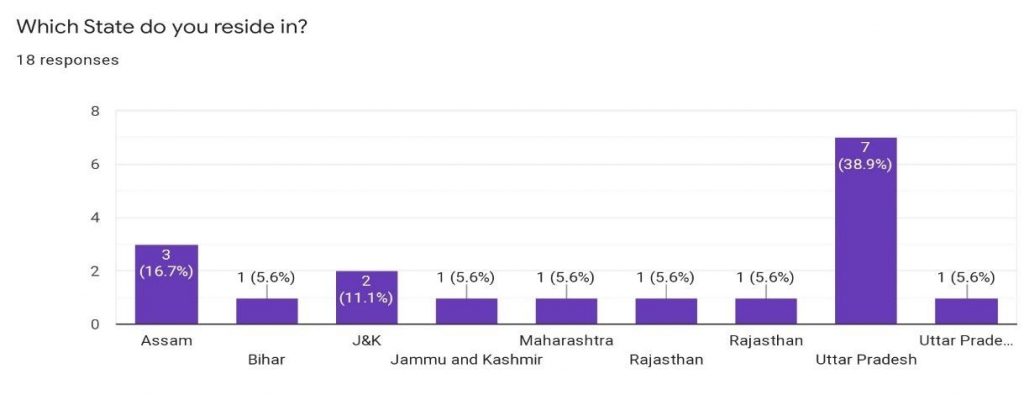
- Rate the quality of the connection services in your area.
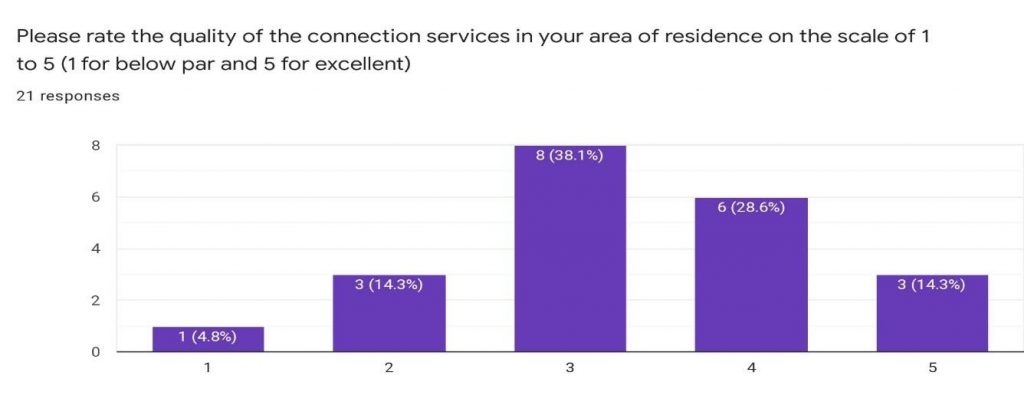
- Have you ever experienced a restraint on the use of internet?
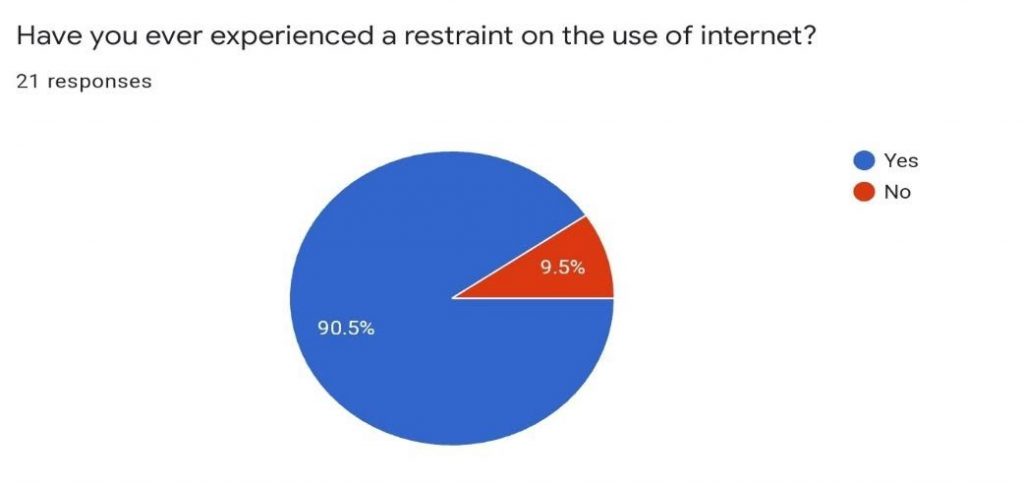
- If yes, then for how long?
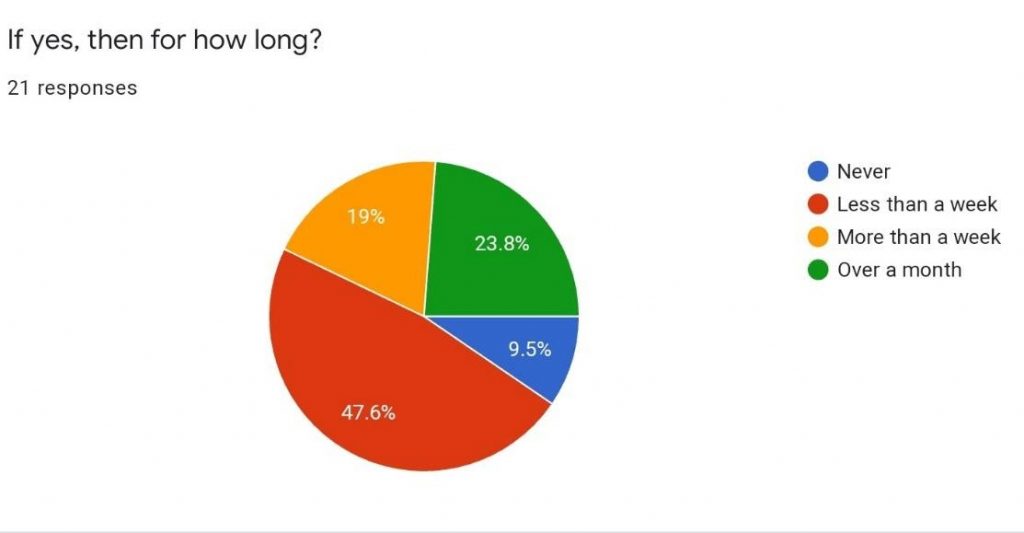
- Do you think that Internet or technology should be made available to every person?
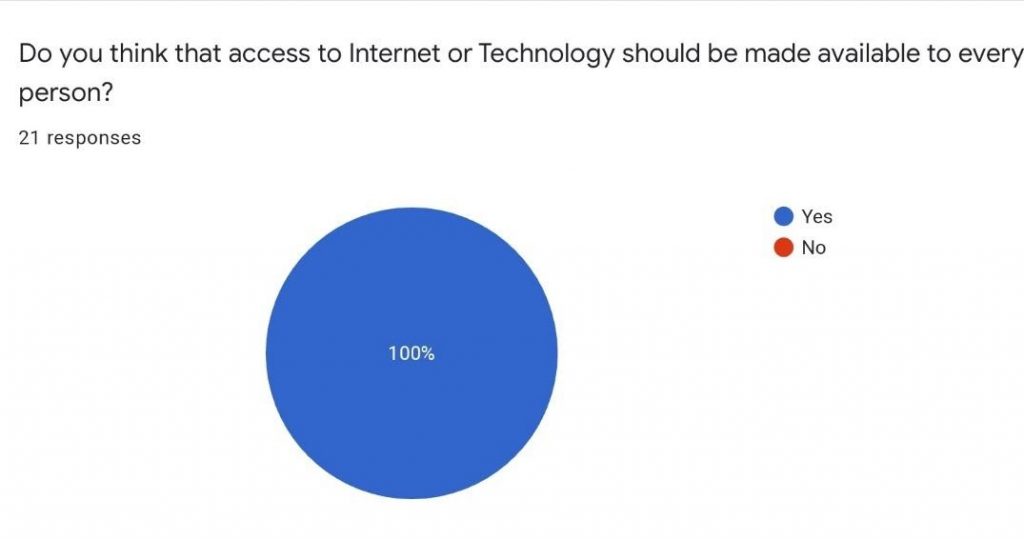
- To what extent do you agree with this statement- “Internet is essential for life”.
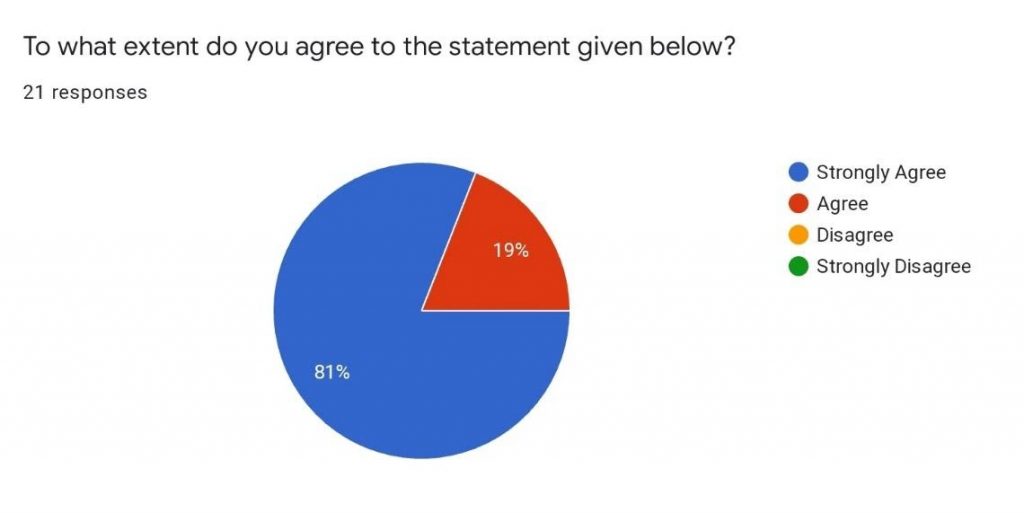
- Internet services should be reasonably priced, so that they are more accessible, yes or no?
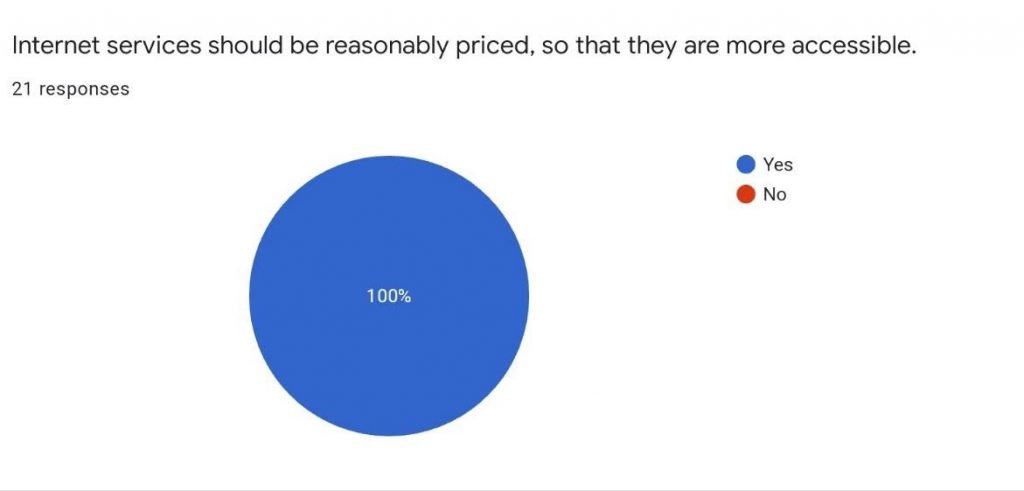
- Do you think that if a person is deprived of the internet access, they are being put at a position of disadvantage?
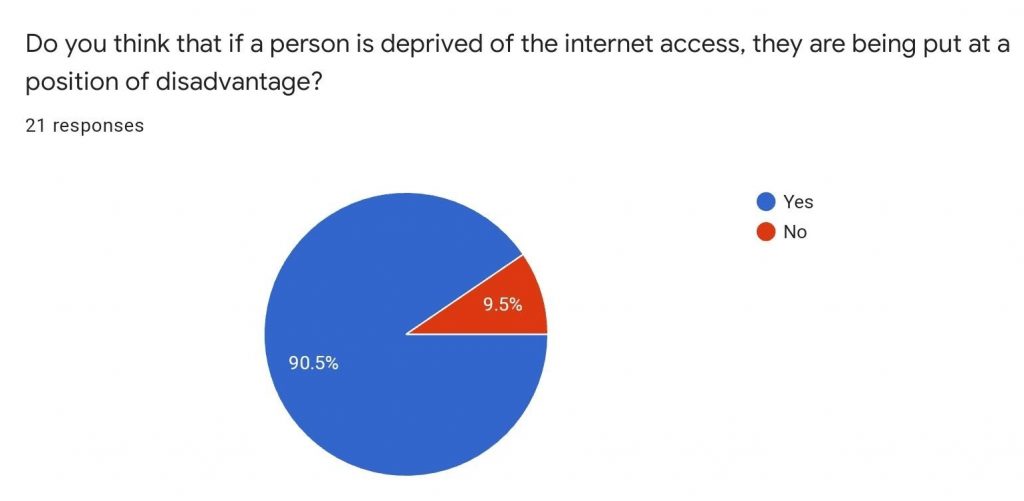
- How do you think the access to modern technology should be classified? As a Necessity or luxury?
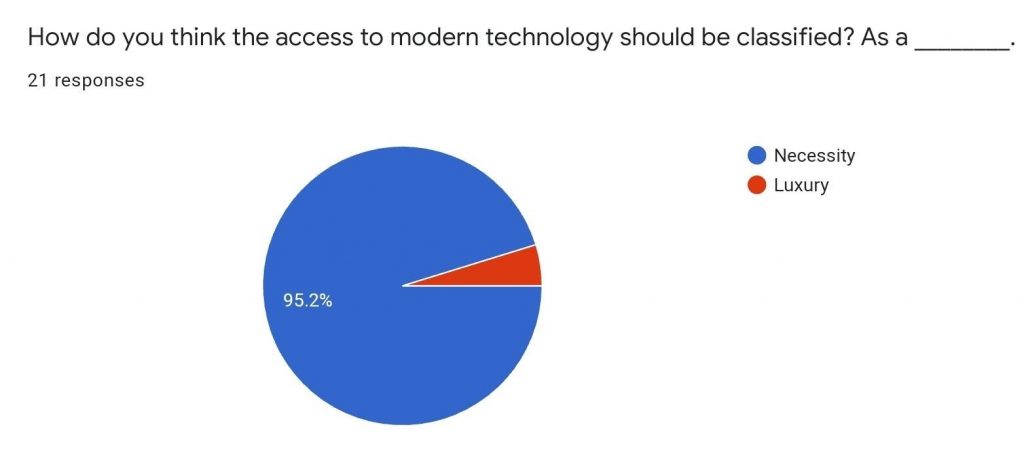
Conclusion and suggestions
The revocation of Article 370 of the Constitution to integrate the state of Jammu and Kashmir as a union territory of India after 72 years of the Kashmir Accord with Raja Hari Singh was followed by democracy’s longest suspension of Internet. It resulted in exclusion of the state from the rest of India in lack of communication facility available to the residents of the state for more than 200 days. One of the applauded tools of the Constitution of India is its promising clause to the people to protect freedom of speech and expression along with protecting the tools instrumental in enabling such freedom. All along the journey of the Apex Court we have witnessed the progressive jurisprudence behind each judgment passed by the Court in order to bridge the gap between the evolving society and the old laws.
And thus, the Apex Court again proved its dynamic approach in catering to the needs of today’s society by holding Access to the internet as an imperative of expressing one’s opinion. However, the protracted battle of the residents of Kashmir with the government is still not over, as the government directed restoring the internet at 2G speed in the state with limited access to websites. This brings us to the argument that even after the development of India in the field of technology and cyberspace, the country is divided in terms of infrastructure and digital literacy which leaves the most vulnerable section of our society deprived of being online.
The 130 pages long judgment of the Supreme Court highlighted many grey areas of the country in terms of failure of constitutional duty of the State to protect the rights and freedom of the citizens of India. One of the note-worth arguments that the court recognized was that “right to information is an important facet of right to freedom of speech and expression.”[36] But why? The answer lies in introspecting the sensitive phase that the country is facing in terms of the political turmoil as well as pandemic. When we talk about certain rights we give it a global outlook, we analyze the weight of such contested rights with respect to its utility and vulnerability.
For example when we talk about education, we give it a global context and put it as an agenda by analyzing whether it constitutes a vulnerable element of the basic part of life, free from which region of the world you reside in. We put it as an agenda because (a) we believe that such rights will be able to make this world better if such rights existed and (b) unite people by ensuring such rights to those who do not have them and balance equality among them. But how does a society determine if certain capabilities should be right is the biggest challenge. To administer this, examination is made between the two with respect to availability of new capabilities available to ordinary people and if people are protected by abuse of new capabilities. The Internet in the present context is not essentially a human right but its misuse threatens attack on human rights. Even more urgently it is extremely necessary to enable and protect basic human rights with its popularity and thus, forms an instrument essential to abridge the gap in communication in the new world.
There is no argument to counter the utility of the internet in accessing information today, almost all the activities from reading newspapers to education to medical care information are provided by the internet. It has played a crucial role in retrieving data and guidelines related to COVID-19 breakout however, due to the restricted access to internet people of Kashmir face a number of problems admitting the lockdown and limited access to internet add to the harassment. Right to Information during a pandemic ensures access to right information, analyzing the risk factor of going to certain places with prior research on precautionary measures and access to treatment on time.
The internet shutdown has far reaching effects in our day to day life, education platforms such as prescribed by UGC guidelines SWAYAM, UBER car services, banking, bill payments, and economy are dependent on the internet. It was thus held by the Kerala High Court that with increase in multiplicity of functions of a mobile phone and access to unlimited data through the internet in it, it is now not a luxury to be online but an indispensable necessity of daily life.[37] Right to education is being hampered due to low speed internet, it has paralyzed the health care sectors to retrieve important information on time and forced daily wage earners and those who depended on online work out of their jobs. Travel agencies have suffered a major setback and competition. The ban on high speed internet has also made it difficult to maintain social distancing and work from home. This contravenes with their freedom to occupation and further hampers their right to live a standard life.
Apart from education, lack of accessibility has caused economic loss round up to crores to the state, loss of jobs and employment has far reaching psychological and sociological effects. In absence of a source of communication it has been reported that women through video recording have shown their concern regarding arbitrary suspension of access to the internet. The sense of feeling unsafe in the volatile region of the country has been aggravated by the limited access to the internet, inability to connect to families and share the location of whereabouts with family is one of many common concerns of young women and parents due to the suspension of mobile internet.
Access to the internet is a right enshrined in the Universal Declaration of Human Rights under article 14. It is a passage to express one’s opinion freely and has been protected under article 19 of the Constitution of India. Social media is one of the many services provided by the internet, however, government’s action to curb the internet service frequently has engineered a gap between those who have access to it and those who do no to avail the benefits and facilities of government through online schemes and portals. Restoration of the Internet is indeed instrumental in protecting the rights enshrined in the Constitution but the steps of the government to restore 2G are arbitrary in nature. With the development of cyberspace and unlimited information, streaming and downloading a several Mbs file with 2G spaces takes time up to hours hence, still abridges the right, therefore, it is concluded that in the lights of Pandemic situation where being online is not a luxury but a necessity-4G internet has become the need of the society.
References
[1] https://www.article19.org/data/files/Internet_Statement_Adopted.pdf (accessed on 4th July, 2020, 15:39)
[2] https://www.nytimes.com/2012/01/05/opinion/internet-access-is-not-a-human-right.html (accessed on 4th July, 2020, 16:08)
[3] https://www.accessnow.org/cms/assets/uploads/2020/02/KeepItOn-2019-report-1.pdf (accessed on 7th July, 2020, 10:09)
[4] Infra 9.
[5] Abid Bashir Wani, Communication Blockade in Kashmir, https://citizenmatters.in/kashmir-business-impact-internet-suspended-post-article-370-15069 (accessed on 7th July, 2020, 10:16)
[6] Government of Jammu and Kashmir, Home Department, Temporary Suspension of Telecom Services-directions available at: http://jkhome.nic.in/22(TSTS)of2020.pdf (accessed on 7th July, 2020, 10:35)
[7] Rajat Kathuria, Mansi Kedia & Gangesh Varma, The Anatomy of an INTERNET BLACKOUT: Measuring the Economic Impact of Internet Shutdowns in India, Indian Council for Research on International Economic Relations, https://icrier.org/pdf/Anatomy_of_an_Internet_Blackout.pdf (accessed on 7th July, 2020, 12:09)
[8] ANNUAL HUMAN RIGHTS REVIEW 2019: A Review of Human Rights situation in Jammu and Kashmir, ¶ 63, https://www.jkccs.net/wp-content/uploads/2019/12/2019-Annual-Human-Rights-Review.pdf (accessed on 9th July, 2020, 13:42)
[9] Hakeem Irfan Rashid, Many lose jobs, migrate due to internet shutdown in Kashmir, The Economics Times, Nov. 14, 2019, https://economictimes.indiatimes.com/news/politics-and-nation/many-lose-jobs-migrate-due-to-internet-shutdown-in-kashmir/articleshow/72057198.cms (accessed on 7th July, 2020, 13:47)
[10] Abid Bashir Wani, 18000 crore rupees, nearly 5 lakh jobs lost as Kashmir reels under internet suspension, Jan. 3, 2020, https://citizenmatters.in/kashmir-business-impact-internet-suspended-post-article-370-15069 (accessed on 7th July, 2020, 14:07)
[11]ANNUAL HUMAN RIGHTS REVIEW 2019: A Review of Human Rights situation in Jammu and Kashmir, Jammu Kashmir Coalition of Civil Society & Association of Parents of Disappeared Persons (31 December 2019), https://www.jkccs.net/wp-content/uploads/2019/12/2019-Annual-Human-Rights-Review.pdf (accessed on 9th July, 2020, 13:42)
[12] https://citizenmatters.in/kashmir-business-impact-internet-suspended-post-article-370-15069 (accessed on 9th July, 2020, 13:55)
[13]Sumeysh Srivastava, Can the Right to Internet Access Flow From the Right to Life?, https://thewire.in/rights/internet-access-fundamental-right (accessed on 9th July, 2020, 14:43)
[14] Arun M. Kumar, A refreshed ‘Digital India’ programme will play critical role in the pursuit of $5 trillion economy, The Economics Times, Jul. 4, 2019, https://economictimes.indiatimes.com/small-biz/startups/newsbuzz/a-refreshed-digital-india-programme-will-play-critical-role-in-the-pursuit-of-5-trillion-economy/articleshow/70067053.cms?from=mdr (accessed on 9th July, 2020, 14:07)
[15]https://www.aljazeera.com/news/2019/08/kashmir-special-status-explained-articles-370-35a190805054643431.html (accessed on July, 15, 2020 at 21: 20).
[16] Anuradha Basin v. UOI, WP(C) 1031/2019; Gulam Nabi Azad v. UOI, WP(C) 1164/2019.
[17] https://www.un.org/en/universal-declaration-human-rights/ (accessed on July 18, 2020 at 13:45).
[18] https://www.humanrights.com/what-are-human-rights/ (accessed on July 20, 2020 at 14:00).
[19]https://www.youthforhumanrights.org/course/lesson/background-of-human-rights/human-rights-an-introduction.html (accessed on July 21, 2020 at 15:15).
[20] https://www.un.org/en/universal-declaration-human-rights/ (accessed on July 21, 2020 at 16:00).
[21] http://www.endslaverynow.org/act/educate/human-rights-and-slavery (accessed on July 21, 2020 at 18:00).
[22] Faheema Shirin R.K. v. State of Kerala, 2019 SCC OnLine Ker 2976 : (2019) 4 KLJ 634: AIR 2020 Ker 35 : (2019) 4 KLT 301.
[23] https://digitalequality.in/right-to-internet/ (accessed on 17th July 2020, 17:03)
[24]https://www.statista.com/statistics/617136/digital-population-worldwide/#:~:text=How%20many%20people%20use%20the,percent%20of%20the%20global%20population (accessed on 17th July 2020, 17:34)
[25] https://www.ohchr.org/en/professionalinterest/pages/vienna.aspx (accessed on 17th July 2020, 17:09)
[26] UN declares Stephanie Borg Psailia, Internet access a human right’ – does it really?, http://igbook.diplomacy.edu/2011/06/internet-access (accessed on 17th July 2020, 18:39)
[27] Paul Scrom SOPA & PIPA: Human Rights in Intellectual Property & Freedom of Speech, http://www.thehumanrightsblog.com/?p=1202 (accessed on 17th July 2020, 19:07)
[28] Doha Centre for Media Freedom, Internet access – a human right?, http://www.dc4mf.org/en/content/internet-access-human-right (accessed on 17th July, 2020, 02:03)
[29] https://www.ohchr.org/en/professionalinterest/pages/ccpr.aspx (accessed on 20th July, 2020, 19:30)
[30] https://www.ohchr.org/en/professionalinterest/pages/ccpr.aspx (accessed on 20th July, 2020, 19:37)
[31] https://www.weforum.org/agenda/2013/04/five-ways-technology-can-help-the-economy/ (accessed on 20th July, 2020, 20:01)
[32] Report of the Special Rapporteur on the promotion and protection of the right to freedom of opinion and expression, Frank La Rue, Human Rights Council, Seventeenth session Agenda item 3, United Nations General Assembly, http://www2.ohchr.org/english/bodies/hrcouncil/docs/17session/A.HRC.17.27_en.pdf (accessed on 20th July, 2020, 20:05)
[33] Supra 30.
[34] Ibid.
[35] Douglas Rutzen and Jacob Zenn, Association and Assembly in the Digital Age, http://www.icnl.org/research/journal/vol13iss4/art_1.htm (accessed on 24th July, 2020, 13:01)
[36] Anuradha Bhasin v. UOI, WP(C) 1031/2019; Gulam Nabi Azad v. UOI, WP(C) 1164/2019, para 14.
[37] Faheema Shirin.R.K v. State Of Kerala, WP(C).No.19716 OF 2019(L), para 6.
LawSikho has created a telegram group for exchanging legal knowledge, referrals and various opportunities. You can click on this link and join:
 Serato DJ Crack 2025Serato DJ PRO Crack
Serato DJ Crack 2025Serato DJ PRO Crack


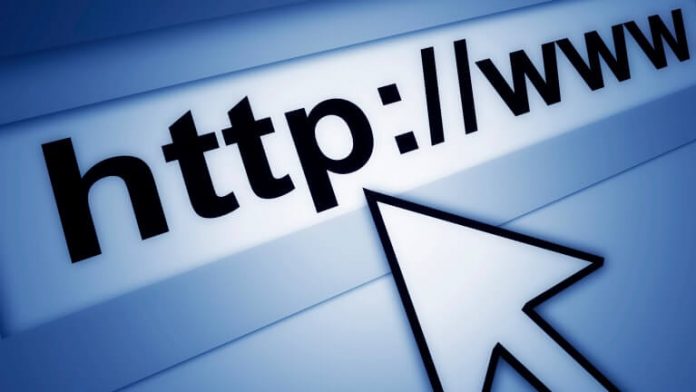









 Allow notifications
Allow notifications


